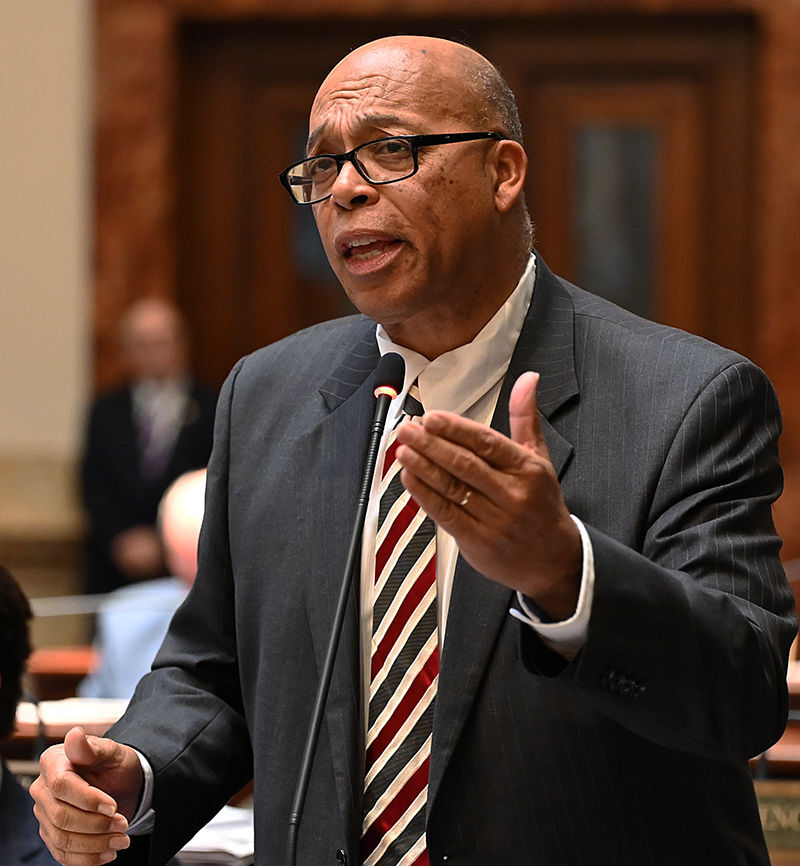TikTok bans, taxes and parents’ rights mark session’s first week
Published 8:00 am Monday, February 13, 2023

- Senate Minority Caucus Chair Reginald Thomas, D-Lexington, expresses his concern with House Bill 1 during a floor speech in the Senate last week.
FRANKFORT – If Kentucky lawmakers held any influencer aspirations, those dreams may soon be dead. Friday, the Kentucky Senate unanimously passed Senate Bill 20, which would ban TikTok from all state government devices and on all state government networks.
TikTok, a video-sharing app, is owned by the Chinese company ByteDance Limited. But it’s not just another social media platform, said bill sponsor State. Sen. Robby Mills, R-Henderson.
Trending
Last November, FBI Director Christopher Wray testified before a House Homeland Security Committee hearing about TikTok’s national security concerns. These include an ability to influence users via the app’s algorithm and collect personal data like search histories, location data and facial recognition markers that may already be being shared with the Chinese government, according to a BuzzFeed News report.
As a result, the head of the Federal Communications Commission, Brendan Carr, sent a letter to Google and Apple asking them to take TikTok off the App Store.
“TikTok is not what it appears to be on the surface. It is not just an app for sharing funny videos or memes,” Carr wrote. “That’s the sheep’s clothing. At its core, TikTok functions as a sophisticated surveillance tool that harvests extensive amounts of personal and sensitive data.”
Gov. Andy Beshear already banned TikTok on all executive branch devices, Mills said.
“We need to protect the data that exists on state government devices, and one very practical way of doing this is to remove a known data mining app from all the state of Kentucky’s digital devices and computers, as this bill does,” he said.
The bill received unanimous approval in the Senate on Friday, and now moves to the House.
Trending
Earlier in the week, the Senate passed House Bill 1, which would retroactively reduce the state income tax from 5% to 4.5% as of Jan. 1, 2023, and a further half percentage point to 4% beginning Jan. 1, 2024, The goal is to continue dropping the tax a half percent each year until the income tax is eliminated altogether.
Christian McDaniel, R-Ryland Heights, said that the income tax cuts are subject to certain “triggers.” For example, if the amount of money in the state’s Budgetary Trust Fund – “the rainy day fund” – is not more than 10% of the following fiscal year’s total revenue before expenses, then that year’s tax reduction will not go into effect.
The Kentucky Center for Economic Policy urged lawmakers to vote against the bill in January. Income taxes make up 41% of the state budget, according to Natalie Cunningham, outreach director for the Kentucky Center for Economic Policy.
A KyPolicy study estimated that the first cut to 4.5% will lead to net loss of $247.6 million in the General Fund in FY23 and an additional $87.6 million in FY24, even after taking into account the 30 or so additional services that will be eligible for sales tax upon the bill’s passage.
Sen. David Yates, D-Louisville, argued that the tax cut is more of a tax restructuring, and that the majority of Kentuckians will end up with less money in their pockets due to the additional sales taxes. He said that the state’s current revenue surplus is “artificially inflated” by federal pandemic aid and should not be used for permanent tax cuts.
“I think we’re missing an opportunity,” Yates said. “This opportunity right now is to reinvest into the programs that we failed, to do the programs that pay back dividends. I think that we fail to look at this like a business.”
Senate Republicans say the bill will bring more businesses and families to Kentucky to broaden the state’s tax base and be better able to compete with neighboring states like Tennessee, which no longer has an income tax.
“In times like this, when economic competitiveness is at an all time high and states regularly compete for the best jobs, for the best employers, for the best opportunities for their citizens, tax policy is the single most influenceable lever that we have to pull,” McDaniel said.
Sen. Reginald Thomas, D-Lexington, called that a “reverse Robin Hood mentality,” and asked lawmakers if they “really wanted to use Memphis as a model.” He said he’d prefer to use the revenue surplus for further tornado and flood recovery needs.
“We could satisfy all that for $600 million, but not now, cause we want to give that money away to somebody else,” Thomas said.
After a lengthy discussion, HB1 passed the Senate 29-5. It now goes to Gov. Beshear, who has not said for certain whether he will veto it.
Beshear will almost certainly veto SB150, introduced this week, if it passes in both chambers. The bill, sponsored by Sen. Max Wise, R-Campbellsville, is a response to Kentucky Department of Education guidance surrounding transgender students.
KDE guidance prioritizes student wishes regarding preferred pronoun usage and what school personnel can tell a transgender student’s parent or guardian about their gender identity. KDE recommends only informing parents with a student’s consent.
“The question is why is there an absence in this KDE toolkit for the role of the parent?” Wise asked.
Wise’s bill would prohibit school districts from requiring or recommending a student’s consent before informing parents about certain information, including their gender identity and any health or mental health services provided to the student by a school.
There is an exception for situations in which the student would be in danger if their parents were told, based on the parent’s known history of conduct.
The bill would also allow school personnel and other students to misgender students who have asked to be referred to by a different name or pronouns. Lastly, it would give parents two weeks to review any curriculum related to human sexuality before instruction begins, and an option to opt out for an alternate assignment if they disapprove.
Sen. Karen Berg, D-Louisville, whose transgender son, Henry Berg-Brousseau, died by suicide last year, made an appeal to the Senate to vote against the bill.
“‘I am going to make an open plea to the members of this body that we avoid politicizing issues that are literally killing our children, that are literally putting them in the grave,” Berg said. “We are putting children in the middle of a political fight between some ostensible right and some ostensible woke culture when most of us are simply trying to do the best for the most.”
After the Senate adjourned, Berg filed two amendments, including one that would allow a student’s parent to require school personnel to address a child by their preferred name or pronoun. Thomas filed an amendment stating that a student whose teacher refused to address them according to their preferred name could be assigned another teacher.






